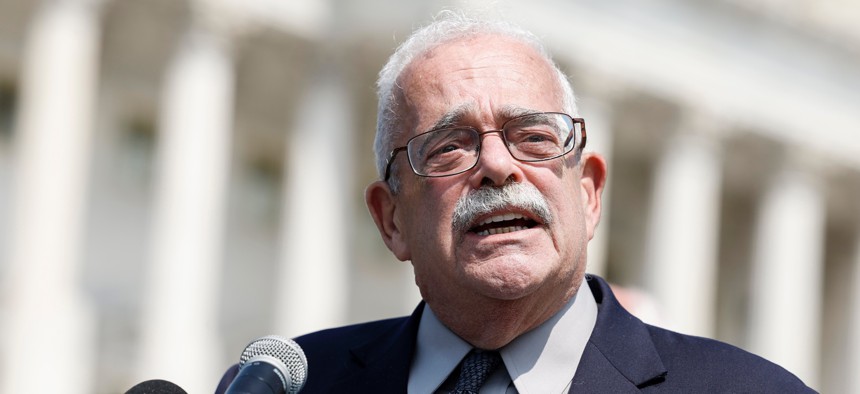
Rep. Gerry Connolly, D-Va., alongside Sen. Brian Schatz, D-Hawaii, has reintroduced the FAIR Pay Act, this time calling for a 4% increase in basic pay for federal employees in 2025, and an average increase of 3.4% to locality pay. Anna Moneymaker / Getty Images
Feds get 7.4% pay raise under congressional Democrats' plan
Despite two years of federal employees receiving the highest pay increases in decades, the Federal Adjustment of Income Rates Act’s sponsors say the federal workforce continues to suffer from “chronic underinvestment.”
A pair of congressional Democrats on Tuesday introduced legislation that would provide federal employees with an average pay raise of 7.4% next year.
The Federal Adjustment of Income Rates Act, introduced by Rep. Gerry Connolly, D-Va., in the House and Sen. Brian Schatz, D-Hawaii, in the Senate, would provide federal workers with a 4.0% across-the-board increase in basic pay next year, as well as an average increase of 3.4% to locality pay. The measure has 59 cosponsors—all Democrats—in the House.
The FAIR Act has been introduced—with slightly different pay raise figures—each year for the better part of a decade. Last year, the lawmakers proposed an average increase of 8.7%, which would have been split between a 4.7% across-the-board raise and an average 4% increase in locality pay.
Though the bill is rarely acted upon, progressive lawmakers and union officials have frequently cited it in debates over annual appropriations. President Biden’s pay raise proposal is expected to be released alongside his annual budget plan sometime in the several weeks.
Though the bill’s sponsors applauded Biden’s efforts to reverse years of “lost wages” that occurred during the Trump administration by providing feds with a 4.6% average raise in 2023 and a 5.2% average increase this year, they said more needs to be done.
“Federal employees served the American people diligently during an unprecedented global pandemic,” Connolly said in a statement. “Before that, they were subjected to the Trump administration’s cruel personal attacks, unsafe work environment, pay freezes, government shutdowns, sequestration cuts, furloughs and mindless across-the-board hiring freezes. Still, they come to work each day to serve with dedication and distinction. Federal employees are our government’s single greatest asset. The FAIR Act is a critical step toward recognizing their contributions and providing fair and just compensation.”
“Whether inspecting our food, conducting medical research or caring for our veterans, federal workers play an important role in our everyday lives and deserve pay which reflects that,” Schatz said. “After years of pay freezes, our bill gives these dedicated public servants a much-deserved raise.”
Labor groups and employee groups from across the federal government quickly voiced their support for the bill upon its introduction Tuesday, citing the tight U.S. labor market and high inflation in recent years.
“Last year, federal employees again lost ground in the fight for a fair wage,” said Randy Erwin, national president of the National Federation of Federal Employees. “Pay increases for 2024 were not enough to offset rising inflation and the widened federal-private [sector] pay deficit, which rose 5% and is now over 27%, according to the most recent report from the Federal Salary Council. Congress must understand that to attract and retain a skilled workforce that best serves the American people, we need to pay our civil servants competitive wages.”
National Treasury Employees Union National President Doreen Greenwald said the proposal would serve as an important tool to compete with private industry for job seekers with critical skillsets.
“By making the federal government a more competitive option for skilled workers, federal agencies can recruit and retain the employees necessary to better serve the American people,” she said. “The federal employees we represent live and work in every city and state across the country, and a fair pay raise will improve the economic security of their families and their communities.”
“AFGE wholeheartedly supports the FAIR Act and thanks Rep. Connolly and Sen. Schatz for its introduction," said American Federation of Government Employees National President Everett Kelley. “After more than two decades of lagging pay that has led to federal employees earning nearly 28% less than their private-sector counterparts, it is time to start making progress toward parity in federal pay. This bill takes a crucial first step in that direction.”
Craig Carter, national president of the Federal Managers Association, joined the chorus on behalf of agency supervisors.
“Federal managers deserve to be treated with respect for their efforts and the work they have performed over many years,” he said. “Every job they hold and perform daily is because of a congressional mandate. It is not too much to ask that, in return, feds be given the ability to maintain a living wage that provides for them and their families.”







